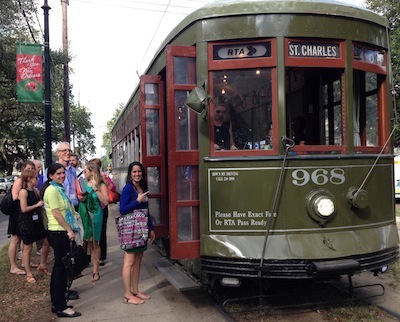
If you texted me last Thursday, you probably didn’t hear back for a while. That goes for emails as well; they piled up in my inbox like Tetris blocks, both constantly and faster all the time. Please accept my apologies for the neglect. I was busy collaborating.
As I sat and stressed about the meetings I wasn’t attending and the emails I should have been composing, I almost missed mention of a website that I checked out on my way back to Providence. The site is chock-full of open resources that will ultimately save me months of work, and it was just the tip of the learning iceberg for me. While it still feels more natural for me to hunker down at my desk and tackle problems on my own, last week’s meetings drove home just how powerful 21st century organization-to-organization collaboration can be.
My colleagues from the Highlander Institute and I had the privilege of traveling down to New Orleans to convene with representatives from the other organizations working on blended learning that are funded by The Learning Accelerator. These include BetterLesson, CFY, The New Teacher Project, Relay Graduate School of Education, and The Friday Institute. Each organization is working on advancing blended learning from a different perspective and with a different approach. Some of us are working nationally, and some of us are tackling this work in the biggest little state in the union.
We were only in New Orleans for 24 short hours, which included a school site visit, a group dinner, and a small internal unconference, but it was more than enough time for us to find common ground, common challenges, and ideas that mutually inspired us. We recognized where we are speaking the same language and where we have developed our own particular dialect, and debated where and when it mattered.
As a new kid on the block, I found myself jotting furious notes about each project, trying to soak it all up in the limited time we had together. My notes were punctuated with pragmatic reminders like, “Ask Juliana for outline” or “Send draft survey to Mary Ann.” We used Google docs to provide feedback on each other’s work and agreed to build a virtual “garage” in which to store and share our resources.
We didn’t leave with all of the answers. Our colleagues’ framework was not an exact match for ours. Their graphics didn’t transfer perfectly for our state-specific work, but it greased the wheels and triggered new insight and that’s why collaboration is so important.
Yes, setting up meetings, commuting to common locations, and organizing agendas takes time; but so does reinventing the wheel. It’s like that old adage, “It takes money to make money.” Maybe it’s also true that it takes time to save time.
This love-hate relationship with collaboration is a repeating pattern among educators. Teachers don’t have enough time to collaborate with other teachers; principals don’t have enough time to collaborate with other principals, and district administrators don’t have enough time to collaborate with other district administrators.
So it doesn’t happen. At least not nearly as much as we’d like to or should. But what if rather than trying to solve the same puzzle individually, we pieced together the sections we’ve each worked out until the larger picture emerges?
That’s one of the goals of Fuse RI. We want to discover and help shine a spotlight on excellent blended learning that is underway in classrooms, and schools, and districts across our state. We want to create opportunities for collaboration and prevent the duplication of efforts as we all try to figure out what it takes to be “future ready.”
We chose the name “Fuse” because it evokes two equally-appropriate concepts: both to set something in motion, as in the lighting of a fuse, and to join to form a single entity, as in the fusion of two pieces of metal.
While we are certainly trying to set something in motion around blended learning in RI, perhaps the project’s greater achievement will be if we can foster a “what’s mine is yours” culture around the sharing of resources and lessons learned. If we can get superintendents to leave their districts to observe each others’ best practices, if we can get teachers to screencast their ideas and post to shared folders, if we can get people to look externally for resources before creating their own–then we’ll have been successful at fusing the state’s education community. And that will do more to drive blended learning across Rhode Island than anything we could ever create in our office.
Because the truth is the pace of innovation is just too quick for any of us to be able to know it all and the cost of wasting time is far too high.
Opinions presented in this blog post are those of the author and do not necessarily represent TLA’s opinion, nor should be considered an endorsement by TLA of any organization or product.

